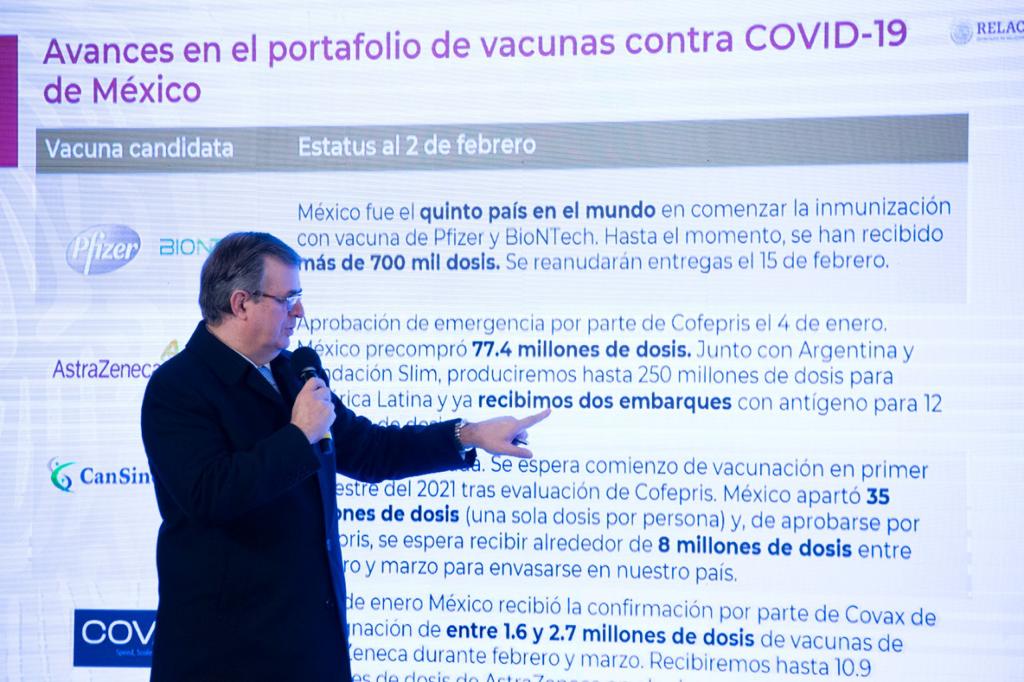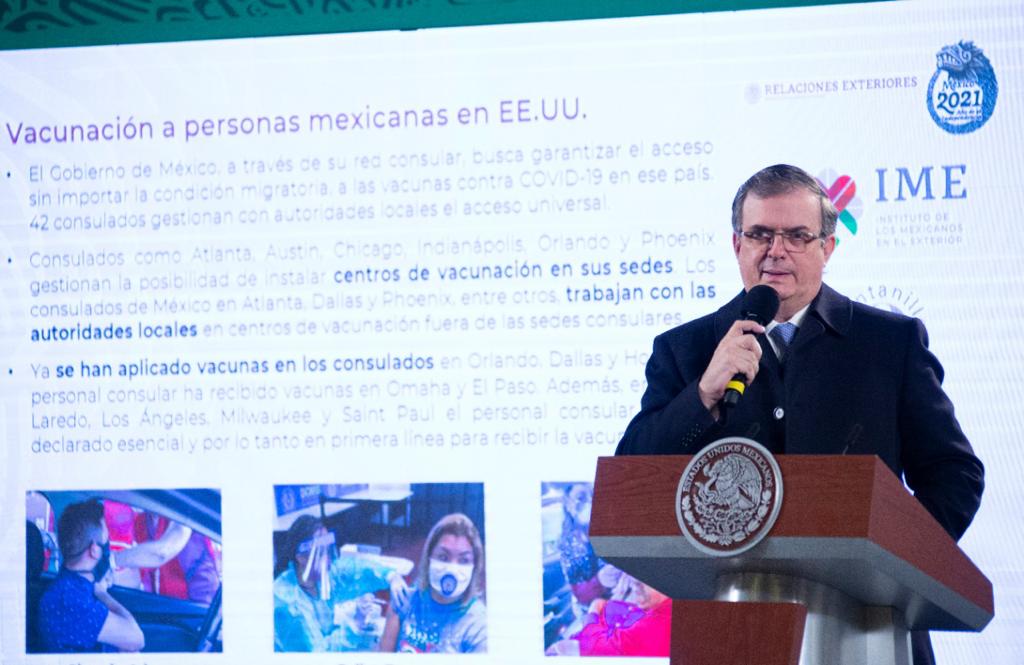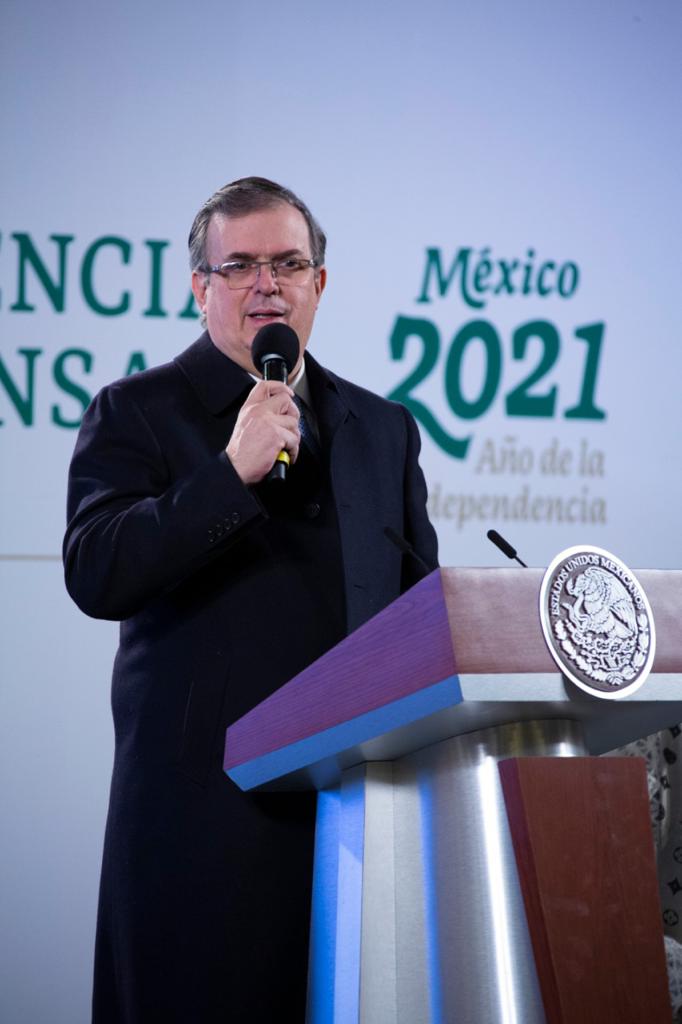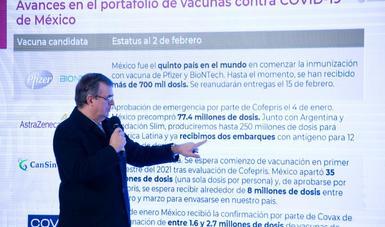Press Release 56
- The Foreign Ministry will monitor the transparency of the Pfizer shipments so that Mexico's access to the vaccines is not restricted.
- "Mexico has a more complete portfolio than practically any other country": Ebrard
During this morning's press conference, led by Interior Secretary Olga Sánchez Cordero on behalf of President Andrés Manuel López Obrador, Foreign Secretary Marcelo Ebrard reported on the progress made in the supply of COVID-19 vaccines acquired by the government, and on the Phase 3 clinical studies underway in Mexico.
Regarding the Pfizer-BioNTech vaccine, the Foreign Secretary said that so far more than 700,000 doses have arrived and that delivery of the rest would resume starting on February 15. The Secretary explained that neither Mexico nor any other country had anticipated that Pfizer would pause in order to increase its production, and that the Foreign Ministry would monitor the transparency of the shipments so that Mexico's access to the vaccines was not restricted.
"I spoke with my counterpart from the European Union, Joseph Borrell, on Friday to express the great concern of Mexico and all of Latin America and the Caribbean that this development doesn’t become an obstacle to shipping the vaccine. They have assured us that this will not be the case, but we are going to make sure that it isn't, and that they don't restrict our access to the vaccines," said the Foreign Secretary. He also said that the doses agreed to and paid for by Mexico would be respected.
Regarding the AstraZeneca vaccine, Mexico has an advance purchase contract for 77.4 million doses. To date, Mexico has received two shipments from Argentina of enough active ingredient to make 12 million doses that will then be distributed in Mexico and Latin America. Regarding Covax, a global pooled procurement mechanism for fair and equitable access to COVID-19 vaccines, Mexico has pre-purchased 51.5 million vaccines from it, and will receive between 1.6 and 2.7 million doses of the AstraZeneca vaccine in February and March, and 10.9 million more doses in the first semester of this year.
Regarding the CanSino vaccine, the Foreign Secretary reported the official purchase of 35 million doses. The government expects to receive about 8 million of them between February and March, and they will be administered in the first quarter of 2021, pending authorization from the Federal Commission for Protection against Health Risks (Cofepris).
Regarding the progress of the Phase 3 clinical studies being done in Mexico, CanSino Biologics has successfully concluded its recruiting in Mexico, the Phase 3 study and its preliminary results will be published in the coming days, and they are promising. In addition, the results of the Phase 3 study for Johnson & Johnson's Janssen vaccine from the United States have been reported, and it is 66 percent effective. Mexico has the option of a contract for up to 22 million doses of this vaccine.
Regarding Novavax and CureVac, both with Phase 3 studies underway in Mexico, Novavax has a reported efficiency of 89.3% and 2,000 Mexican volunteers are expected to participate. CureVac, a German vaccine candidate, will administer 8,000 doses during its clinical trial in Mexico.
Foreign Secretary Ebrard also reported that the Russian Sputnik V vaccine is still waiting for authorization from Cofepris, and the French Sanofi-Pasteur vaccine is in new Phase 2 trials to increase the response in older adults. Therefore, he said, we are one of the countries with the most Phase 3 trials underway at this time, concluding, "We will absolutely have vaccines. It is a fact that Mexico has a portfolio of them that almost no other country has."
Lastly, the Foreign Secretary repeated the commitment of the Government of Mexico to guarantee, through its consular network, access to COVID-19 vaccines for our fellow citizens abroad. In this context, he announced that the new U.S. administration had issued an order so that all people, regardless of their immigration status, are included in the vaccination process. In addition, he commended the efforts of Mexico's consulates in the U.S. for managing the vaccination of consular personnel and for seeking to install vaccination centers on their premises and at locations that our migrants can get to easily.



